UAF photo by Eric Engman.
The band O Tallulah plays during the Music in the Garden series at the Georgeson Botanical
Garden in June 2022.
By Julie Stricker
On a sunny July evening, hundreds of people unfold lawn chairs and spread blankets on the lush green grass between banks of colorful flowers at the Georgeson Botanical Garden. A band warms up on the stage. Children chase after bees and butterflies while the adults soak up the sun.
The Georgeson is a gem, said Michelle Bartlett, director of UAF Summer Sessions and Lifelong Learning, which organizes the Music in the Garden concert series. “It’s beautiful. It’s peaceful. It invites people in.”
Georgeson, a nationally recognized botanical garden, sits on the eastern side of the Fairbanks Experiment Farm — a facility established in 1906 that is part of the UAF Agriculture and Forestry Experiment Station. Nine out of the garden’s 20 acres are maintained with herbs, ornamental trees, vegetables and just about every flower that can be grown within 100 miles of the Arctic Circle. Its mission includes research, education and outreach about high-latitude horticulture.
And Georgeson’s popularity is growing. In addition to Music in the Garden, it serves as an outdoor classroom for children and adults, is a meeting place for groups and attracts tourists and locals for a stroll. The Babula Children’s Garden and the two-acre Wild Rose Maze are a popular outing for families, made possible through donations from Dr. Walt and Marita Babula.
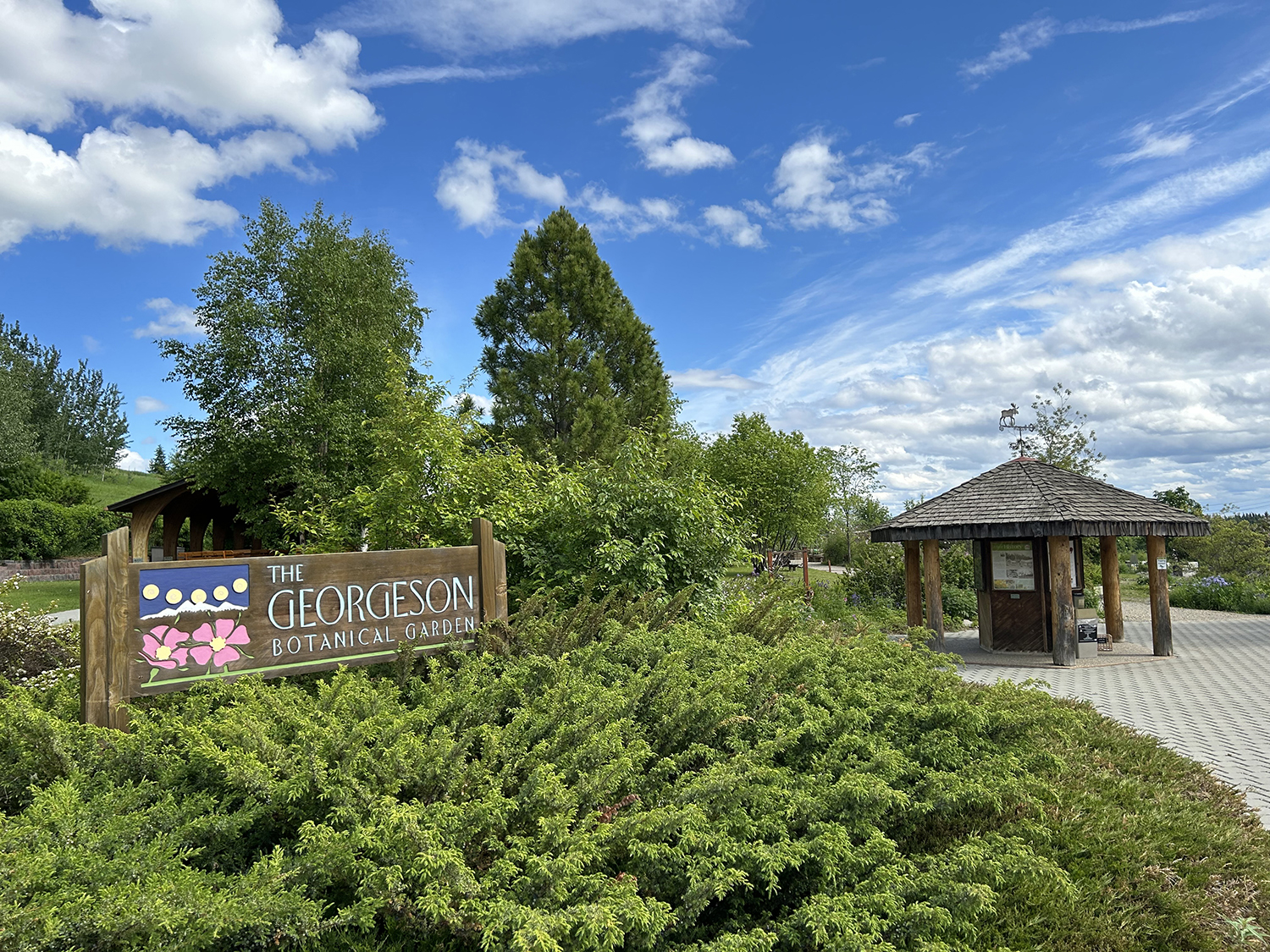
A sign marks the entrance to the Georgeson Botanical Garden.
This growth, however, hasn’t come with a corresponding increase in funding as the university grappled with severe financial challenges. Instead, budget cuts over the past several years also pruned the Georgeson staff. What makes this garden grow is a dedicated group of benefactors who are passionate about this sub-Arctic oasis, spearheaded by its small, all-volunteer board, the Georgeson Botanical Garden Friends.
Patty Kastelic has been president of the board for about four years. The other members are Becky Hassebroek, Marsha Munsell, Aldona Jonaitis, Mel Sikes and Elizabeth Paxson.
Munsell described the Friends’ job as “an auxiliary to help keep the garden financially solvent.” She paused, laughed and added, “or just viable.”
UAF funds one full-time position, manager Katie DiCristina.
“We adore Katie,” Jonaitis said. “She is brilliant. She’s charming. She knows her plan. And she’s very innovative and she’s got lots of ideas. The only thing that could possibly get in her way is the fact that it costs money.”
Each year, the Friends provide almost all the funding for seeds, maintenance, a second full-time staffer (operations lead Lacey Higham) and several seasonal positions. They raise money through regular donations from garden supporters, appeals to the public at Music in the Gardens, Alaska Lotto, grants, and donations from entities such as the Rasmuson Foundation, which built a service road away from the pedestrian area last year.
(The Friends) “all put in so much time,” DiCristina said. “When the garden lost its funding and went from four staff to one, they started to really restructure and become the force that they are today. The garden could not survive without them.”
They aren’t afraid to get their hands dirty, either. Kastelic and her sister harvest peonies for bouquet subscriptions and a dinner in the garden in July called “Wine and Peonies.”
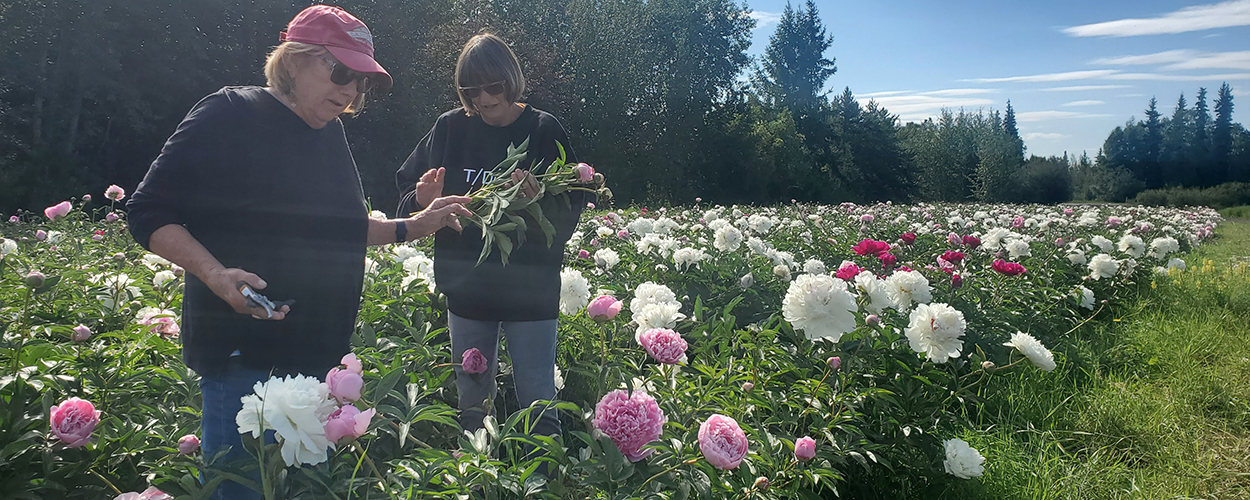
Patty Kastelic and her sister, Glen Upton, harvest peonies in preparation for a GBG Friends’ fundraiser in July 2021.
“That’s our big fundraiser where we raise the most of our money that doesn’t come from people who directly support the garden on a monthly or annual basis,” Kastelic said.
If there is one flower that encapsulates the intersection of science, beauty and business in the Georgeson, it’s the peony. In the late 1990s, horticulture professor Pat Holloway ’79, now emeritus, was speaking at a conference, listing the flowers that bloom in Fairbanks in the summer. That list included peonies. Afterward, one of the conference-goers sought out Holloway and told her, “You have something no one else in the world has. You have peonies blooming in July.”
In 2001, Holloway planted a test plot of peonies in the Georgeson. With the success of these first plants, word spread and growers around Alaska discovered a ready market for the dinner plate-size blooms. Today, more than 135 growers export more than 300,000 blooms annually. Peonies are one of Alaska’s major agricultural commodities and one of very few home-grown exports.
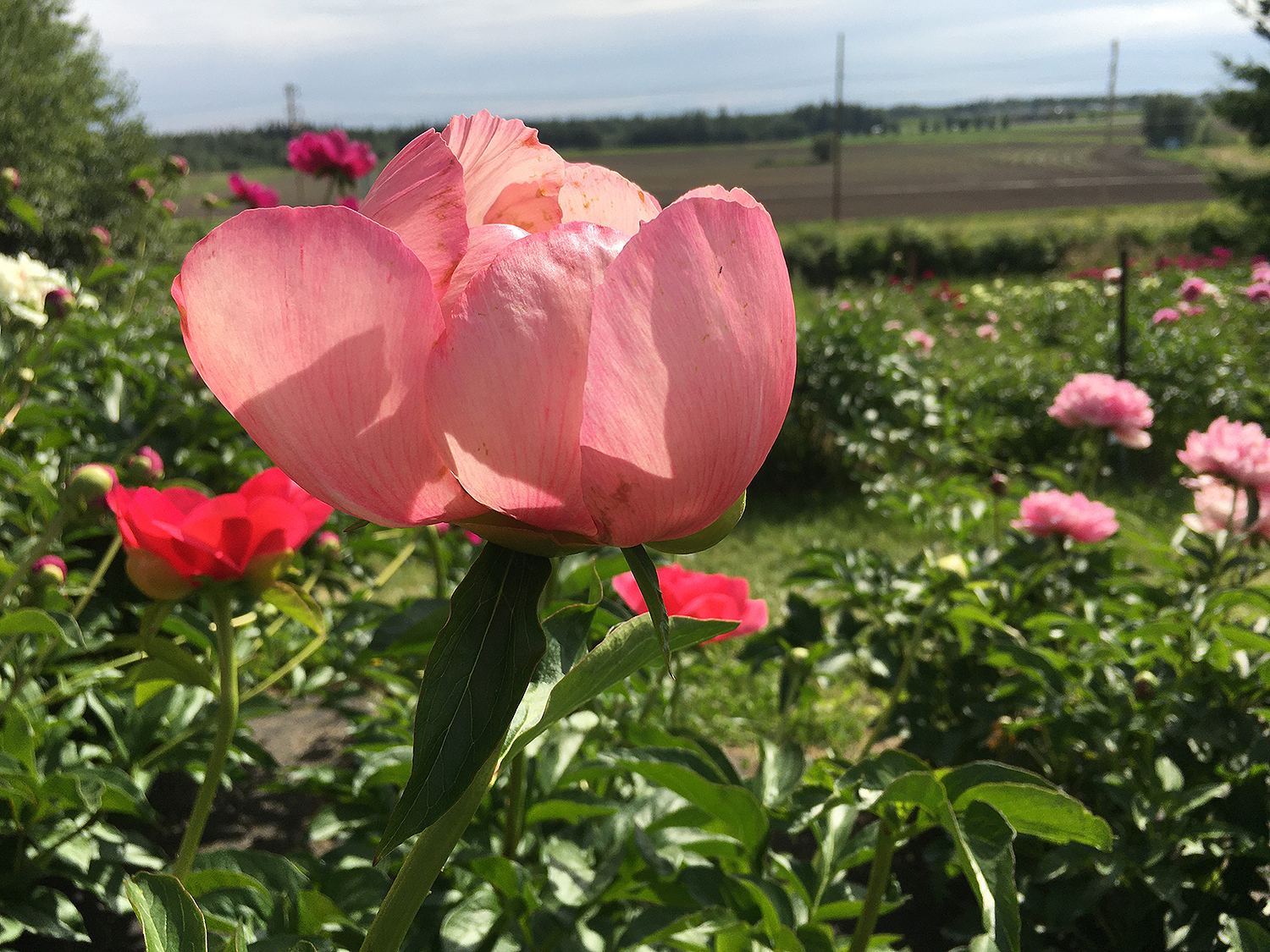
The fields of the Fairbanks Experiment Farm can be seen behind a showy peony in the Georgeson Botanical Garden.
“The peonies are the thing that we are well known for, and peonies are the flower that helps us raise the money that we raise in the summer,” Kastelic said.
Because the GBG Friends is a nonprofit, it can administer grants, Munsell said. The accounting can get complicated, which is where board treasurer Becky Hassebroek comes in.
“I may be the legs of the Friends, but Becky (Hassebroek) is the true heart,” Kastelic said.
Hassebroek had been serving on a national garden board when she decided she wanted to have a hand in a local project and joined the GBG Friends.
“I was able to see that this small group of lovely, caring, passionate people had a master plan,” she said. “They had dreams and they had visions. And the plan was absolutely incredible. But of course, there was no money to do anything like that.”
Hassebroek said Fairbanks has been good to her and her husband, Marv. They decided they wanted to give something back to the community and help move the Georgeson forward. They donated $200,000 to build a path through the garden that was traversable by children and people with disabilities.
When problems arose with the construction — the path as it was first built was gravel and not wheelchair accessible — Becky Hassebroek and DiCristina went to the university and said the path was not acceptable. With financial support from Vice Chancellor of Administration Julie Queen ’06 and the Provost’s Office, the path, now called the Hassebroek Promenade, was rebuilt.
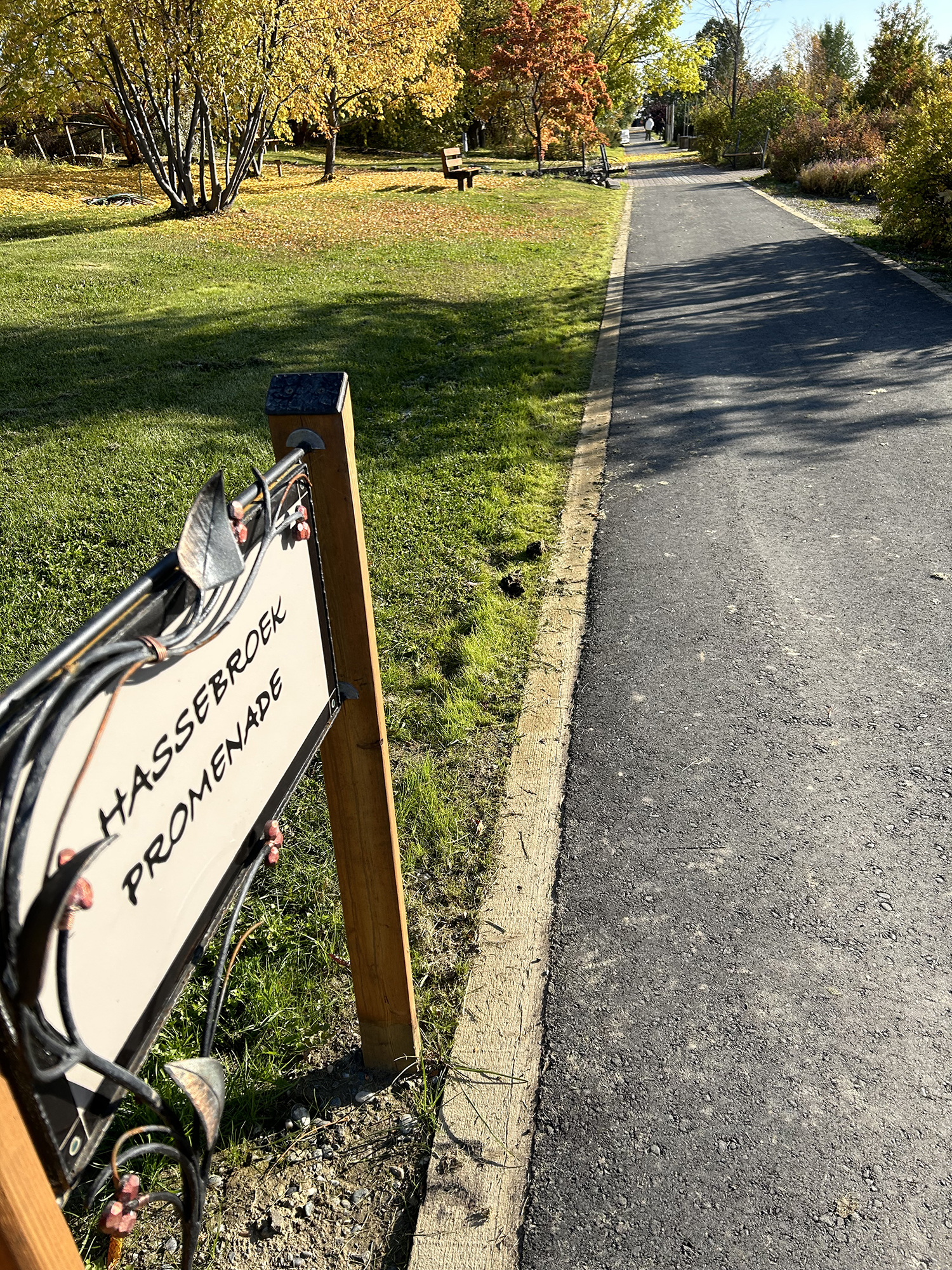
The Hassebroek Promenade provides a path through the Georgeson Botanical Garden that is accessible to all.
“That’s kind of been part of what the Friends do, too,” Munsell said. “We stand up for the garden.”
Hassebroek said she was working in the garden after the promenade was completed when a woman told her a story that made her heart smile.
The woman said she and her husband used to come to the garden to take a walk every day. Her husband suffered some medical problems, which put him in a wheelchair, making him unable to navigate the former gravel path. With the completion of the new promenade, he was able to come again.
“They were so very thankful,” Hassebroek said. “That made up for any of the hardships that we had with trying to get the path going.”
Visitors enjoy the varied activities and plants nestled throughout the Georgeson, such as the Babula Children’s Garden, the Herb Garden, the Risse Shade Garden and the Penny Wakefield Dye Garden, as well as the Rotary Pavilion and Beistline Classroom and Cutting Garden. These areas, among others, are also nurtured by the university and the Fairbanks community.
In 2003, peony researcher Jan Hanscom and Holloway worked with Fairbanks dentist Walt Babula and his wife, Marita, to fund the development of a children’s garden.
“We decided that we’d like to do something special for the kids and positive for the community,” Walt Babula said when the plans for the children’s garden were released. The Babulas have contributed to the garden every year since, working closely with the University of Alaska Foundation, which recently recategorized their fund as an endowment.
The UA Foundation wrote a grant that resulted in funding from the Rasmuson Foundation for a service road, which allows maintenance equipment to move around the garden without disrupting pedestrians. The Georgeson is also included in the UA Foundation’s annual Giving Day.
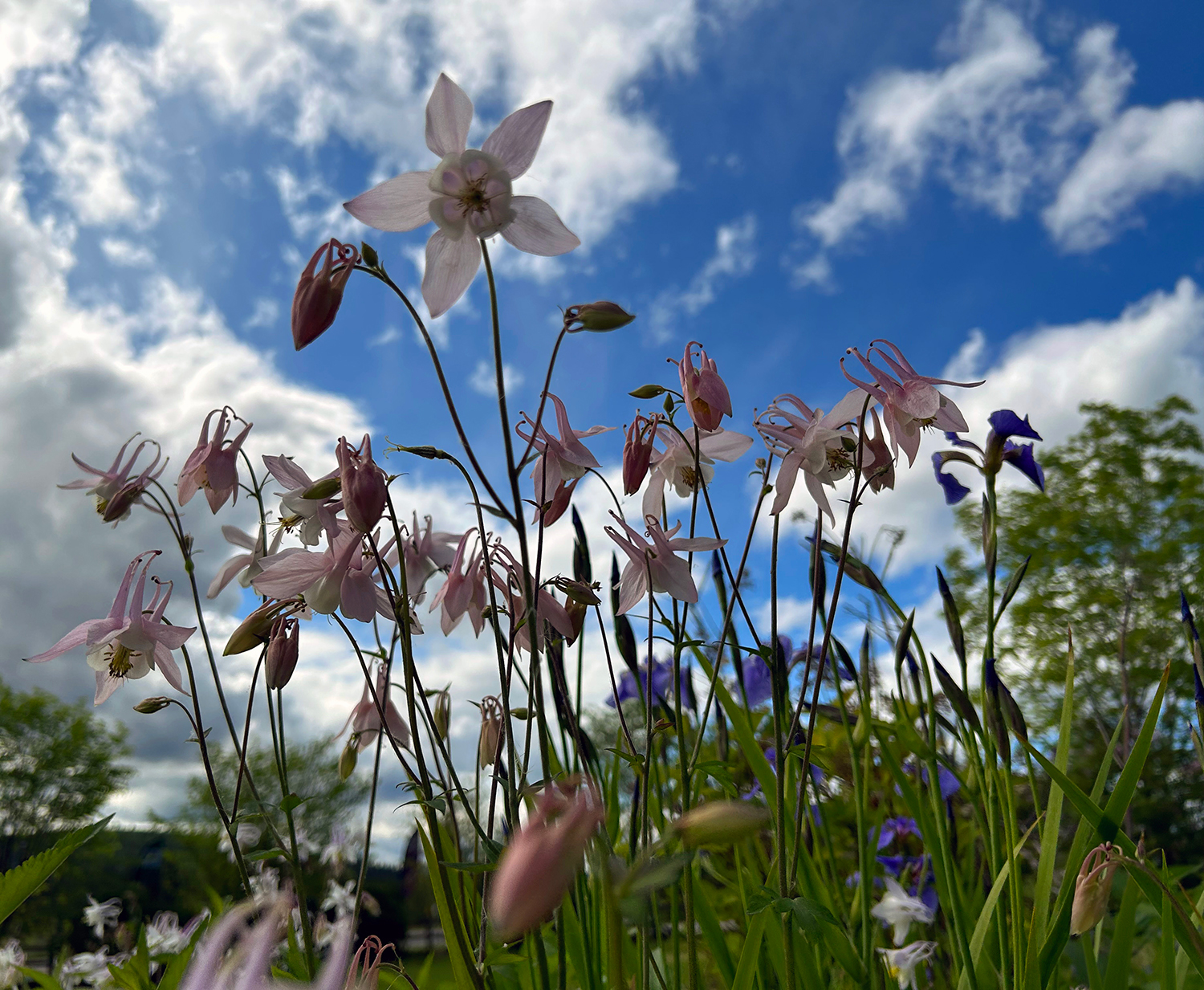
Columbines bloom at the Georgeson Botanical Garden
“We get financial support from a lot of community organizations,” Kastelic said. For example, GVEA GoodCents grants provided new equipment, including four electric mowers, which are quiet, nonpolluting and come with rechargeable batteries.
“That’s an example of the community partnerships that really make a tangible difference,” Kastelic said.
Each board member has a favorite area of the garden, or sometimes more than one.
When asked about her favorite area, Jonaitis laughed, saying, “It’s kind of like, which of your children do you like the most? Your dog who you think is the best? Literally, I don’t think I can answer that question. Because they have flowers. They have herbs. They have fruit trees. They have growing vegetables. They have all the trees or everything that you can grow in the sub-Arctic, and that is my favorite thing. My favorite thing in the garden is all the different plants that grow in this region.”
Sikes sought inspiration at the Georgeson for her own yard and garden when she moved to the area in 2006.
“I knew if they could grow there, I could grow it at my house,” she said. “And it was so vibrant, and everything they were doing there gave me hope for my own garden.”
Iron benches, arches and decorative figures made by Fairbanks craftsman Thomas Hart are positioned throughout the garden. These are accented by ceramic signs by artist Nancy Hausle Johnson.
“They're brilliant,” Jonaitis said. “They are just so talented and imaginative and creative. The combination of growing art and visual art says so much about what the garden is all about.”
“It’s really lovely to have a partnership with local, talented artists, which have become a hallmark and part of the garden’s style,” Kastelic said. “Before we started raising money and paying for them to create benches, signage, arches, etc., it was not part of the aesthetic. I think it’s a lovely addition, and we’ll continue to do that as money allows.”
Hassebroek said Lotto Alaska has made a tremendous difference for the Georgeson. Most of the Friends’ fundraising goes toward labor and garden supplies, but the addition of Lotto Alaska money gives the Friends extra money for these benches, fences, arches and signs and to build for the future.
One goal is to build a water fountain or water bottle refilling station in the garden, Paxson said. The supply used to water the plants isn’t potable, so the board sells water bottles at a concession stand during Music in the Garden. Paxson said the board wants to reduce or stop using plastic entirely.
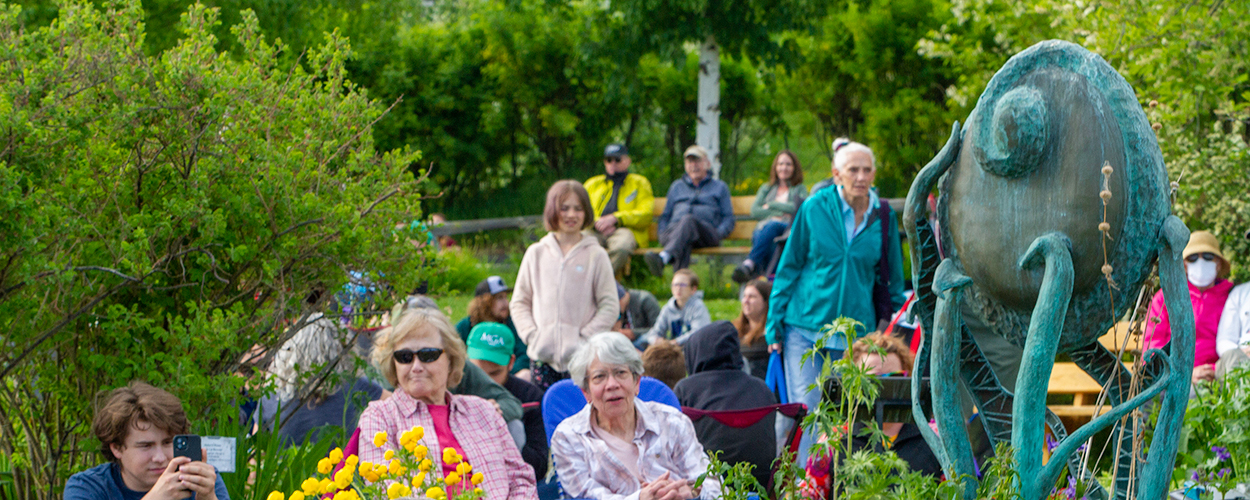
Attendees enjoy the music of O Tallulah during a Music in the Garden concert at the Georgeson Botanical Garden in June 2022. The 12-week concert series is organized by UAF Summer Sessions and Lifelong Learning.
“We try to be as waste-free as possible,” she said. The board has reached out to companies that sell water in cardboard containers but hasn’t had any luck yet.
“We’re chipping away at that one slowly,” she said. “We’re either going to try and raise funds to get a water fountain constructed in the garden or find alternative options to plastic water bottles.”
The board itself would like to expand, but Paxson said attracting interest in nonprofit organizations isn’t easy these days.
“I'm 27,” she said. “I have not met many people my age or younger interacting in boards and stuff. I think it’s unfamiliar territory. And so I just wish there were more people my age to take on the responsibility. Because at the end of the day, the garden and multiple boards in Fairbanks would not be running without members. But sadly, there’s no one applying.”
Jonaitis said working with the Friends is a pleasure.
“We laugh and we love each other,” she said. “I think it’s a great group of people that does pretty extraordinary work.”
“(The Georgeson) is just a wonderful community resource,” Kastelic said. “And it’s a great place for the university and the community to intersect. And that it takes the effort and caring of many, many people to keep it functioning.”


